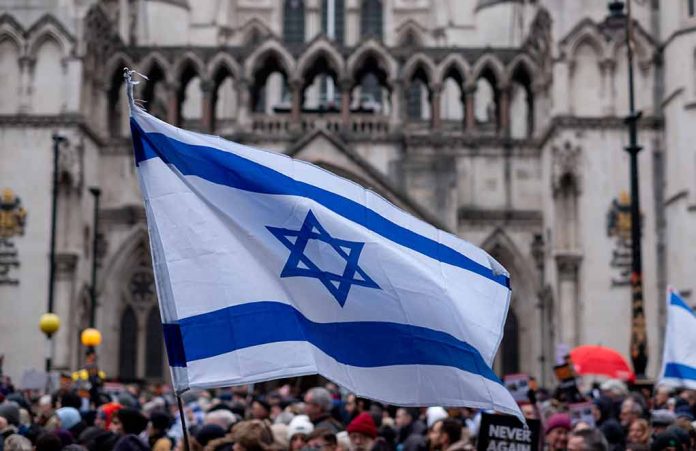
Israel’s refusal to allow Arab foreign ministers to visit the West Bank proves its “extremism and rejection of peace,” according to Saudi Arabia, as diplomatic tensions reach new heights ahead of critical peace negotiations.
Key Takeaways
- Saudi Arabia condemned Israel for blocking Arab foreign ministers from visiting Palestinian President Mahmoud Abbas in the West Bank, calling it proof of “extremism and refusal of any serious attempts for a peaceful pathway”
- The blocked delegation included Saudi Foreign Minister Prince Faisal bin Farhan Al Saud, whose visit would have been the first by a top Saudi official to the West Bank in recent memory
- Israeli officials claimed the Palestinian Authority planned to host a “provocative meeting” to promote Palestinian statehood
- An international conference co-chaired by France and Saudi Arabia is scheduled in New York from June 17-20 to discuss Palestinian statehood and security arrangements
- The incident further strains prospects for Arab-Israeli normalization as international pressure mounts for a two-state solution
Saudi Arabia’s Sharp Condemnation
Saudi Arabia has issued a forceful rebuke of Israel’s decision to block a delegation of Arab foreign ministers from visiting the occupied West Bank. Saudi Foreign Minister Prince Faisal bin Farhan Al Saud declared during a news conference in Amman, Jordan that Israel’s actions demonstrate its unwillingness to engage in peace efforts. The blocked visit was intended as a diplomatic mission to meet with Palestinian President Mahmoud Abbas in Ramallah, part of broader Arab support for Palestinian diplomacy amid the ongoing conflict in Gaza.
“Israel’s refusal of the committee’s visit to the West Bank embodies and confirms its extremism and refusal of any serious attempts for [a] peaceful pathway … It strengthens our will to double our diplomatic efforts within the international community to face this arrogance,” Said Prince Faisal bin Farhan Al Saud, Saudi Foreign Minister
The planned visit carried significant diplomatic weight, as Prince Faisal’s presence would have marked the first visit by a top Saudi official to the West Bank in recent memory. Israel, which controls all airspace and borders of the West Bank, exercised its authority to deny permission for the high-profile diplomatic mission. Jordan’s Foreign Minister Ayman Safadi joined in the criticism, stating that Israel’s actions were “killing any chance of a just and comprehensive” Arab-Israeli settlement.
Israel’s Justification for the Blockade
Israeli officials defended their decision to block the Arab ministers’ visit by characterizing the planned meeting as provocative. According to Israeli sources, the Palestinian Authority intended to use the visit as a platform to promote the establishment of a Palestinian state. This comes at a time when the Israeli government under President Trump’s ally Prime Minister Netanyahu has consistently opposed the creation of a Palestinian state, viewing it as a potential security threat to Israel.
“Which to this day refuses to condemn the October 7 massacre – intended to host in Ramallah a provocative meeting of foreign ministers from Arab countries to discuss According to The Palestinian Authority.
The timing of this diplomatic standoff is particularly significant as it occurs just weeks before an international conference co-chaired by France and Saudi Arabia, scheduled to take place in New York from June 17 to 20. The conference aims to address Palestinian statehood, security arrangements following a potential ceasefire in Gaza, and reconstruction plans for the region. The blockade of Arab ministers raises serious questions about Israel’s willingness to engage in meaningful dialogue at the upcoming conference.
International Pressure and Regional Implications
Israel faces mounting pressure from the United Nations and various European countries that continue to advocate for a two-state solution to the Israeli-Palestinian conflict. The blocked visit has become emblematic of the challenges facing any peace process in the region. Egypt’s participation in the diplomatic effort was also notable, with Egyptian Foreign Minister Badr Abdelatty emphasizing that the upcoming New York conference would address critical issues including security arrangements and reconstruction plans to prevent Palestinian displacement.
The incident threatens to undermine potential normalization efforts between Saudi Arabia and Israel, which President Trump has been encouraging. Saudi Arabia has consistently maintained that recognition of Israel would be contingent on concrete progress toward Palestinian statehood. By blocking the Arab delegation, Israel appears to be taking a hardline stance that may further complicate regional diplomacy and entrench existing tensions rather than creating pathways toward lasting peace and stability in the Middle East.




